Once upon a time, people queued for a good product to get it cheaper and before it ran out. But with the advent of online business in Nigeria, those long queues became online shoppers crashing a site on the launch of a product.
Every online business in Nigeria dreams of getting flooded with orders. However, what happens when you get flooded and are unprepared? It could lead to a bad reputation if customers’ orders are missing or payment gets lost.
That’s why you need to prepare for your online business in Nigeria to ensure that operations return to normal if your site crashes. This article will guide you to starting an online business in Nigeria in 10 easy steps.

Step 1: Choosing a Profitable Business Idea
The first step in your online business journey is to come up with a profitable business idea. Conduct thorough market research to understand consumer needs, preferences, and trends. Look for gaps in the market that your business can fill effectively.
Additionally, assess your own interests, skills, and expertise to ensure alignment with the chosen business idea. Read more below.
Identify the Best Online Businesses in Nigeria
The beauty of online business is that it allows for more flexibility than traditional business. With an online business, you can make money from anywhere, anytime. Additionally, you can start a store in Nigeria online and make money without a physical office.
Below is a table representation of the best online business ideas in Nigeria and how much you can earn from each:
| S/N | Online Businesses in Nigeria | Average Pay Per Month ($) |
| 1 | Blogging | $0 – $5,000 |
| 2 | Affiliate marketing | $0 – $6,000 |
| 3 | Ecommerce store | $0 – $10,000 |
| 4 | Freelancer | $0 – $1000 |
| 5 | Online coaching business | $0 – $1000 |
| 6 | Social media Influencing | $0 – $7000 |
Affiliate marketing, ecommerce business, and dropshipping involve selling physical products. If you are interested in any of them, then you should proceed.
Make a List of 5 Profitable Niches You Enjoy
As an affiliate marketer or dropshipper, you need to go for niches you don’t hate discussing. Meanwhile, it should also be a high-paying niche.
You can make money from selling these products in Nigeria that pay well:
- Health And Beauty;
- Weight Loss and Fitness;
- Electronics;
- Fashion;
- Baby Products;
- Phones And Accessories;
- Gaming;
- Home And Office Equipment.
You can also choose to sell in Nigeria and abroad. Ensure you have confirmed that you can sell the products to a foreign audience. Great foreign niche ideas include golf, yoga, makeup, supplements, and health and wellness.
Step 2: Conducting Market Research and Analyzing the Competition
Competitive market research is one of the best ways to discover your selling point as an online business in Nigeria. It’s an in-depth exercise that helps you leverage what your competition is missing. Market research can be easy if you follow these steps.
Identify Your Competitors
If you are the sole supplier or manufacturer of your products, you need to list your direct or indirect competitors. An example of a direct competitor in the skincare industry would be Diary of a Nigerian Girl (DANG).
An indirect competitor is Zaron Cosmetics. They could start a skincare line in the future. Meanwhile, you need to study them to see the strategies you can implement in your online business. Make a list of more direct than indirect competitors.
Determine What Products Your Competitors Offer
The heart of an online business is the product and the service. This is a great place to start researching if you want to succeed and make money online.
All you have to do is answer the following questions:
- What products do they sell?
- Are their products low or high-cost?
- Who are their ideal customers?
- What is their unique selling proposition?
- How do they distribute their products/services?
- What are their sales tactics and results?
- What is their pricing model and strategy?
For example, besides the DANG community, the brand supplies candles and skincare products. What can you do differently or better?
Analyzing How Your Competitors Market Their Products
Analyzing your competitor’s marketing strategy and tactic is the fastest way to scale your business in Nigeria.
You can use the following questions for quicker results:
- 1. Do they have a blog?
- 2. Do they post videos or webinars?
- 3. Do they have a podcast?
- 4. Do they have a FAQs section on their blog?
- 5. Do they use case studies?
- 6. Do they use a social media influencer?
DANG has an active social media community on Instagram, which has been a tremendous source of income for the brand.
If you wish to start an online business in Nigeria, you should also consider the tools your competitors use and their level of engagement. Lastly, perform a SWOT analysis to know their strengths, weaknesses, opportunities, and threats.
Step 3: Defining Your Target Audience and Developing a Customer Persona
If the heart of the business is the product, then the buyer persona is oxygen to make a lot of money online. While a buyer persona represents your ideal customer, your target audience is a broader group of people with similar characteristics to your buyer persona.
Before choosing your product, you should create a buyer persona that needs your product. If you are at this stage, you can use the information from your market research as a guide. You should also fill out the buyer persona template below.
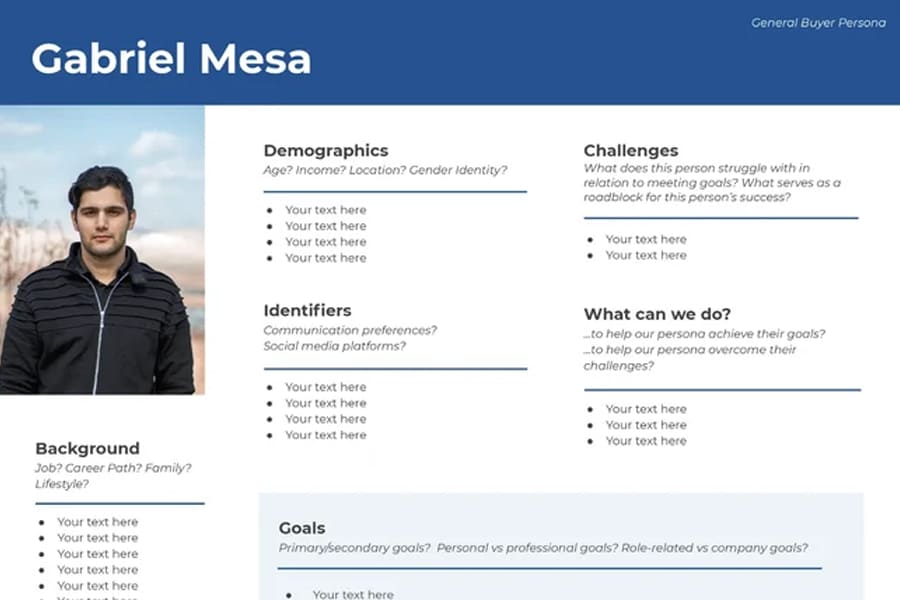
With a buyer persona, you can make a lot of content and messaging to appeal to your audience online. Also, you can create multiple customer persona, allowing you to segment your audience.
It enables you to create personalized content for each segment on social media.
Step 4: Creating a Business Plan for Your Online Business in Nigeria
An ecommerce business plan is an online business document that outlines your goals, industry, competitors, and resources.
To start this type of business, you need a detailed business plan, so read on below.
Giving an Executive Summary
You need a solid plan and vision to make money online. That’s where the executive summary comes in.
It consists of an overview of your business, including an introduction, mission statement, competitive advantage, financial projections, and company goals.
Listing and Describing Your Business
You will explain your business, vision statements, values, and purpose at this stage. For example, Life Is Good, a t-shirt brand, has a mission statement: To spread the power of optimism.
It could be as simple as that or as long as that of InvisionApp: Transform the way people work together by helping them collaborate better. Faster. On everything. From anywhere.
Providing Details About Your Products and Services
What’s a business plan without the details of your products or services?
Your business plan should entail the following about your products:
- Product Features: For example, our product contains serotonin and acrylic acid.
- Product benefits: For instance, our product can last 24 hours and cure blackheads.
- Product selling point: For example, we offer a product line that does not bleach or blemish the skin and reduces signs of aging.
Once you are done listing all the benefits of your products, you should outline your pricing model. Should it be a cost-plus pricing where the cost of the product is determined by the unit cost of the product added to a percentage?
Or competitor-based pricing, where your price will be similar to the competition. It is up to you and your industry to decide on a suitable pricing strategy.
You should include your market analysis, marketing strategy, sales plan, and legal notes in your business plan. Later in this article, we will discuss creating a marketing plan.
Step 5: Choosing the Right Ecommerce Platform and Setting up Your Website
There are different ecommerce platforms in Nigeria. You should choose based on your business preference.
Below, you will find more information about the different platforms and their features.
Platforms for Vendor-specific Shops
This type of ecommerce platform is perfect for different types of businesses. NEXT BASKET, for example, allows you to build your ecommerce website within a few minutes, manage your products, and run your business seamlessly.
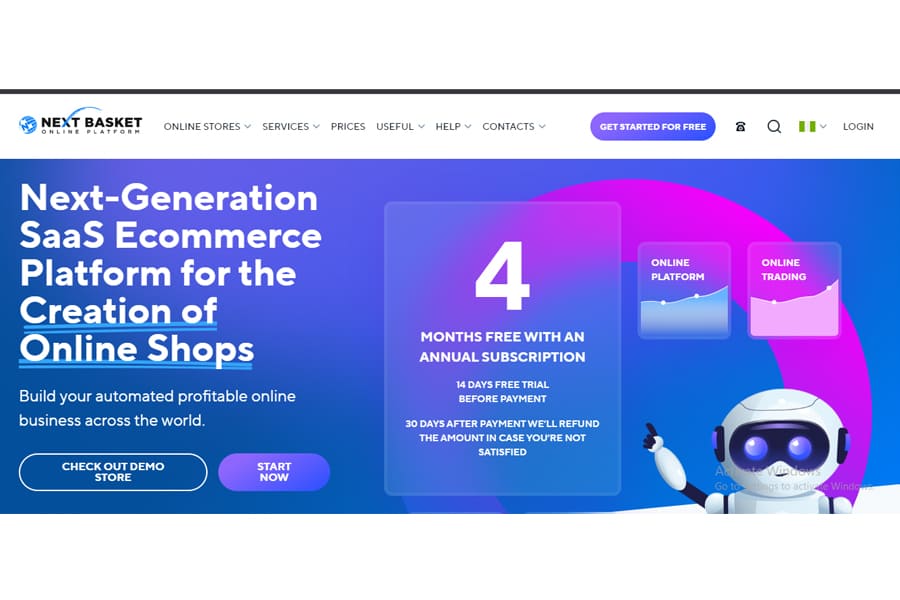
Multi-Vendor Online Retail Shops
You can sell your products through multi-vendor online retailer websites. These types of websites have many sellers but a single website owner. Usually, the owner handles the overhead costs of hosting, delivery & backend development.
Meanwhile, sellers have little control over the website’s rules and policies, and violations can result in a store ban. Jumia, Chowdeck, Amazon, and Etsy are great examples of these types of stores.
Marketplace Websites
Like the multi-vendor relative shop, a marketplace also connects vendors & buyers. However, the vendor is in charge of handling the shipment & fulfillment.
Taaskly & Etsy platforms are examples of such marketplaces.
Affiliate Websites
With affiliate marketing, you are not opening a store. If you wish to start in Nigeria, all you need to do is set up an account with an affiliate program and generate traffic to start earning.
You can make through:
- Direct Sales – Earn a commission when you sell a product or service.
- Clicks – Earn from an affiliate revenue when website visitors click on your link (cost-per-click).
- Leads – Earn a commission on actions like social media follows, ebook downloads, etc.
You can place your affiliate links in a blog post, YouTube description, ads, and social media bio. The more, the better it is to generate traffic and sales.
Step 6: Setting up Payment Gateways and Choosing a Delivery Method
A payment gateway in Nigeria is a technology that allows credit card payments online and offline. In the case of online businesses in Nigeria, Flutterwave, Paystack, SeerBit, Interswitch, Remita, and Monnify are popular online payment gateways.
Firstly, you have to set up your ecommerce store to set up a payment gateway. You could choose a payment gateway from the listed options above. The setup is usually different based on the platform you choose. Ensure you select a patent gateway that is trusted and with excellent customer support.
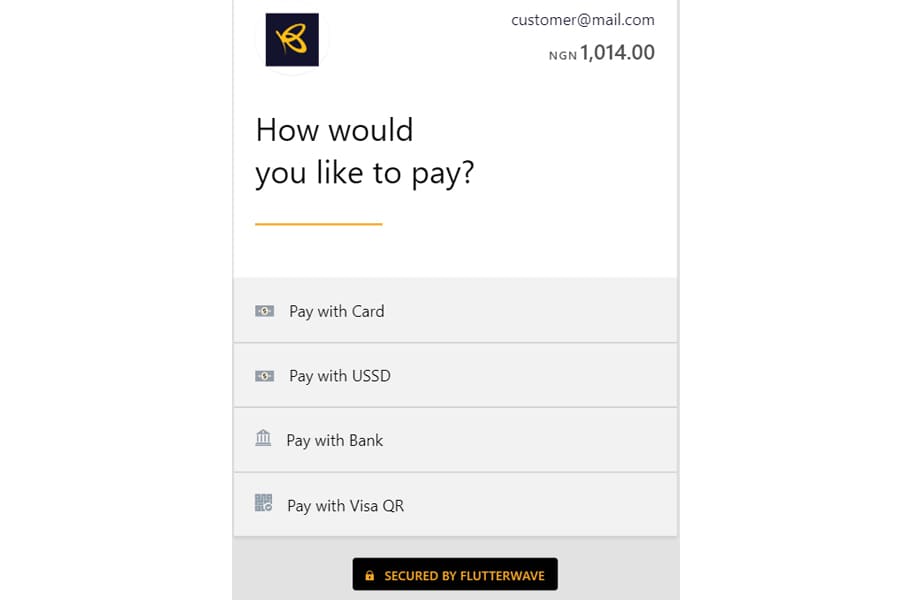
Step 7: Developing a Marketing Strategy for Your Online Business in Nigeria
This is where the real work begins. It’s time to plan the strategy to sell the work you have done so far. Your marketing strategy will be the plan for reaching your goals, so it should be clear, focused, and realistic since you have created a buyer persona.
It is straightforward to build a marketing strategy following the steps below:
- Identify your goals and the marketing tools you need.
- Create a checklist of the strategies of your indirect and direct competitors.
- Evaluate how those strategies fit your business and select them appropriately.
- Brainstorm new ways to improve the strategies.
- Create a content calendar for a month.
- Plan how to track results.
You will need to implement both strategies and tactics to grow your business. The difference between a strategy and a tactic is their scope and time frame.
Step 8: Launching Your Online Business and Generating Traffic to Your Website
Every business owner wants their business to gain traction from day one. The truth is it may only happen for some businesses.
However, depending on your appetite, you can do a pre-launch, launch, and post-launch marketing phase.
Pre-Launch Stage
During the pre-launch phase, you need to gather resources to make your product marketable. You can organize a survey to determine whether people need your product or service or not.
Also, you need to get a group of people to test your product. These testers can be paying customers. Don’t forget to pay attention to the product packaging, order processing and delivery to your customers.
Launch Stage
The product launch stage is a crucial phase in the life cycle of a product, marking its introduction to the market. This stage involves various activities and strategies aimed at bringing a new product to the attention of potential customers and generating initial sales.
The product launch is characterized by meticulous planning, coordination, and execution to create a positive and lasting impression in the minds of consumers.
Post-Launch Stage
After launch, you need consistency to remain relevant as an online business in Nigeria.
You can do the following to ensure consistency:
- 1. Keep educating your customers on social media.
- 2. Start a newsletter and invite them.
- 3. Use a social media influencer (if necessary).
- 4. Run ads.
- 5. Have a system for customer support, social media management and finance management.
Always remember that running a business is like going to school. You can fail a test and pass your exams. It’s a learning process; no matter how prepared you are, there are always unforeseen events.
Step 9: Optimizing Your Website for Search Engines (SEO)
Search Engine Optimisation enables your site or store to get found. Some ecommerce solutions offer SEO services and allow you to have a blog, helping you to optimize for search engines.
According to Forbes, the first page of Google captures 71% of clicks, so you must optimize for keywords to be on the first page. The following are ways to optimize your site for search engines.
Keyword Optimisation
Your shop can contain valuable items, but no one will find them if you are not using the right keywords. Google processes a billion searches per day, so you must use keywords people are looking for in your website or store.
Keyword research tools like SEMrush give you insight into keyword volume and difficulty determining which to target. For example, the keyword Online Business in Nigeria has a monthly search volume of 800 and a low keyword difficulty, making it a good option for a small blog.
Meanwhile, it’s not enough to include keywords. It is crucial to have them in essential parts of your content, such as meta title, meta description, H1 heading, at least two H2 headings in the body, the first paragraph, image file names, and alt text. Keep your meta title (60 characters) and description (260 characters) short and make them actionable.
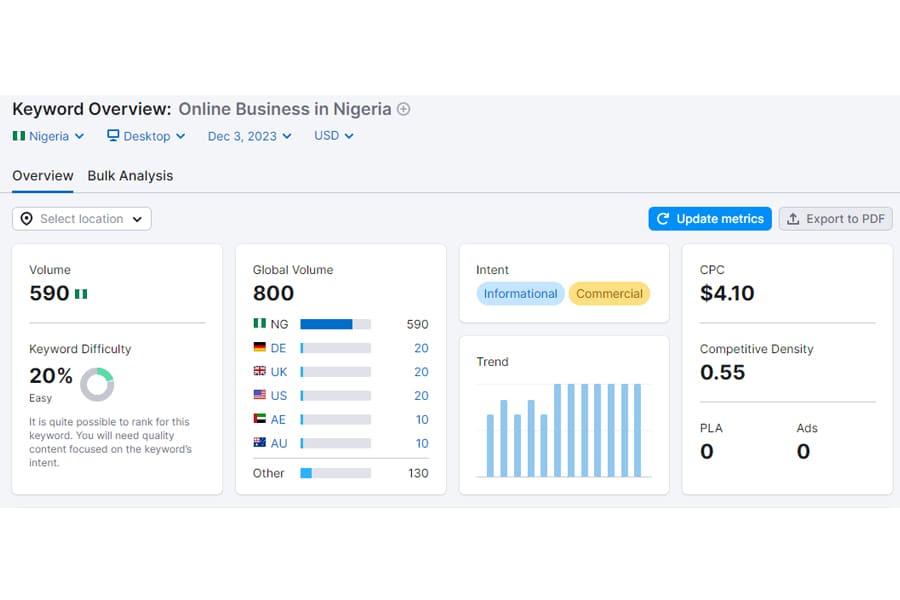
Finding Long-tail Keywords
Aside from the target keywords, there are some more keywords you should include in your content, such as the secondary and long tail keywords.
To get keyword ideas, you should check Google suggestions, people also ask, and related search lists. For example, this is the Google prediction list when we search for starting an online business in Nigeria.
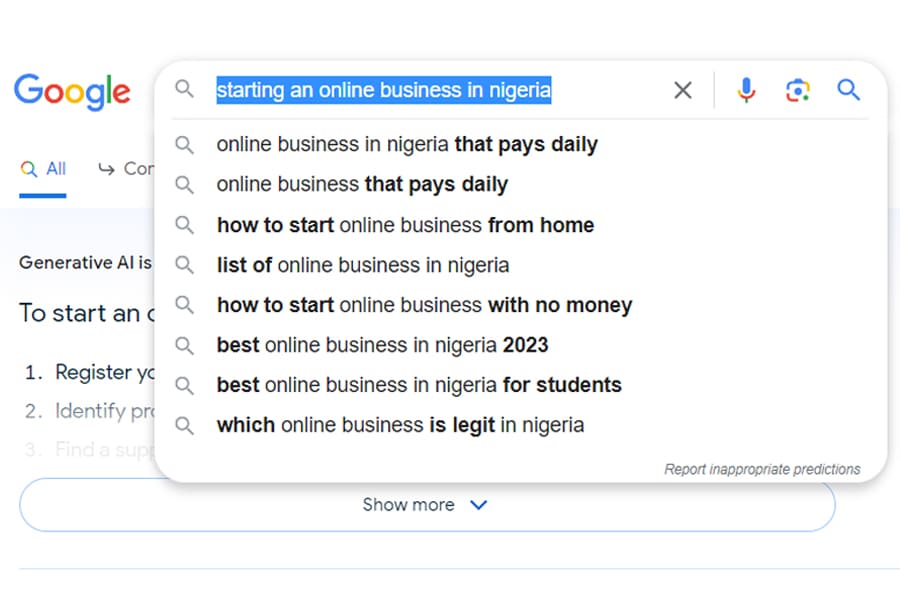
Internal Linking
Ensure that links to past content or a new product are included in the recent article. Anywhere between 1 and 3 links to other pages on your site is perfect.
Doing this drives traffic to other pages of your site and keeps visitors longer on them.
Improving Your Page Speed
Nobody likes to wait for a web page to be loaded, especially with the high competition. Your bounce rate can affect your search position, so you should optimize your pages immediately by reducing image sizes, reducing redirects (linking to more pages on your sites), and using an excellent hosting platform.
Google’s PageSpeed Insights tool can help you rate your site’s performance and suggest ways to improve your Core Web Vitals.
Implementing Schema Markup
Schema markup is an indirect factor that may improve your ranking. The search engine bot can easily find, crawl, and index your page when you use Schema markup.
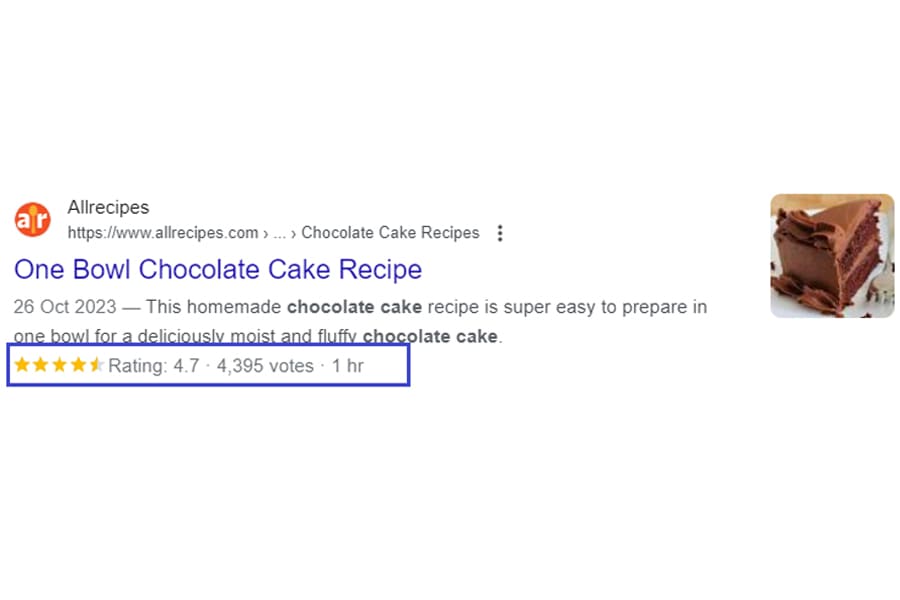
Link Building
Aside from the keyword, the most influential Google ranking factor is getting quality backlinks to your site. The more credible sites link to your site, the higher your Domain Authority (DA). Your DA affects your tanking position, which also involves your traffic.
To improve your backlinks, you can reach out to credible sites and propose that they insert your links to their article if they find it useful. You can also offer to write guest posts in exchange for inserting your links.
Step 10: Scaling Your Online Business and Expanding Your Reach
If you have already done the instructions we mentioned so far, you have done 90% of the job of scaling your business. All you need is to be consistent and apply the following.
Suppose you want to reach more people other than your circle of friends; paid advertising is the fastest way to achieve this. You can run an ad through Google, Facebook and Instagram.
Consider converting past visitors who are yet to buy into customers through retargeting. According to 99firms, Retargeting can increase conversion rates by as much as 150%.
Once your customer base grows, you can’t manually handle your orders anymore. Use the help of an automation service or AI chatbot to make your life easy.Selling online comes with hesitation from customers who have never seen your product. Therefore, you should use the testimonials and reviews from past customers all over your site and on social media to convince them. You should also implement your customers’ feedback to grow your business.
Frequently Asked Questions
How can I start an online business in Nigeria?
Following the guide in the article, you should be able to start an online business in Nigeria.
What online business can I do with 5000 Naira?
Importation business and dropshipping can allow you to start your business on preorder, but it could go over 5000, especially if you are a beginner.
What online services are in demand in Nigeria?
This includes blogging, affiliate marketing, freelancing, and online coaching business.